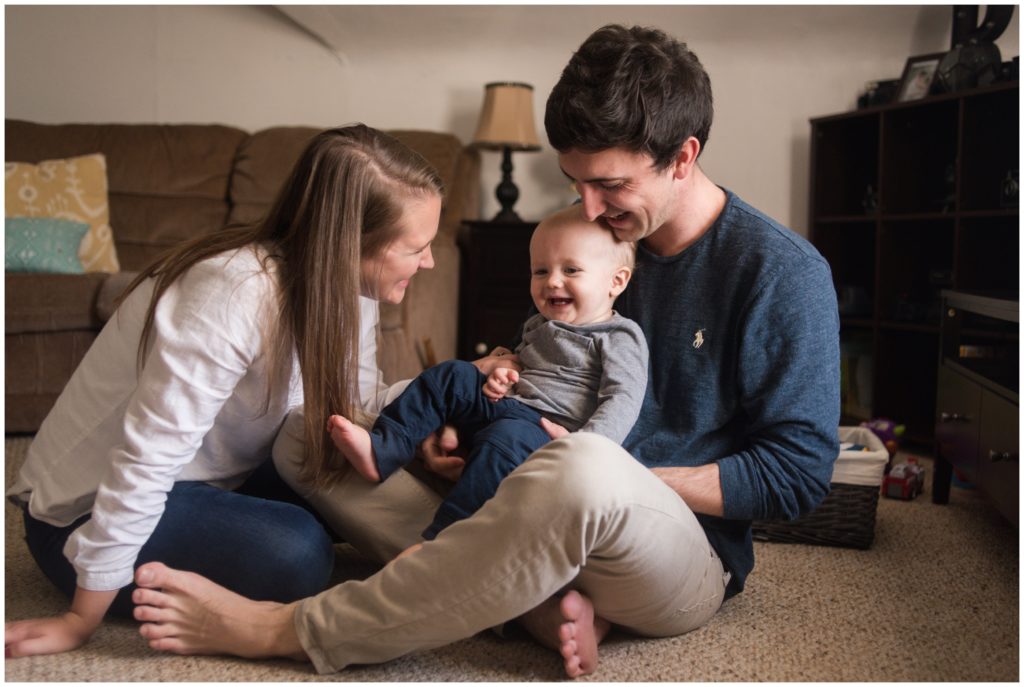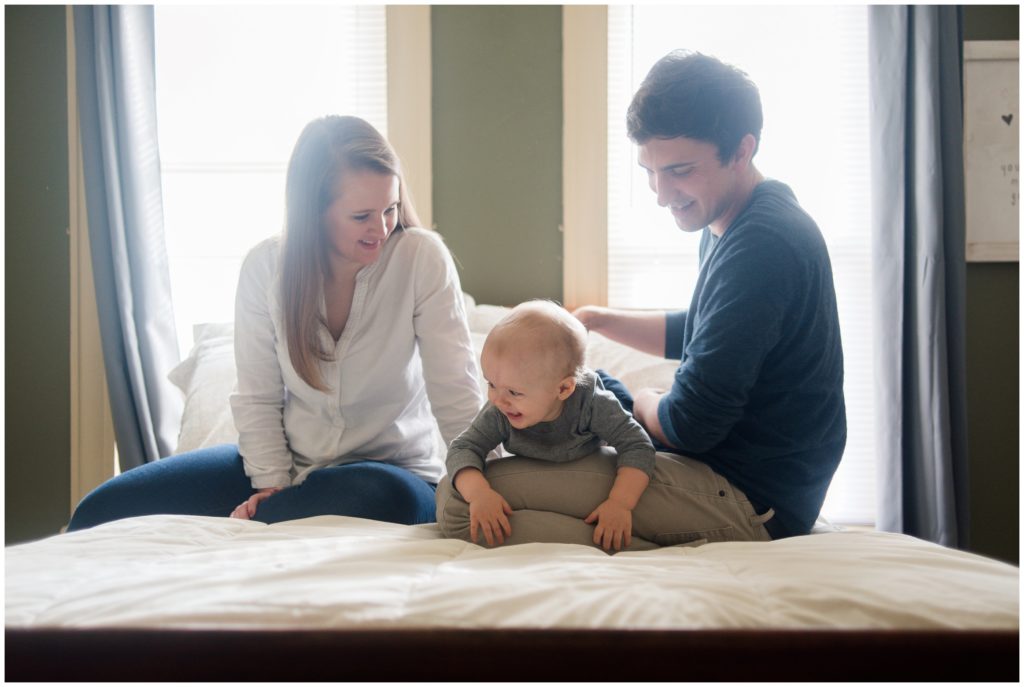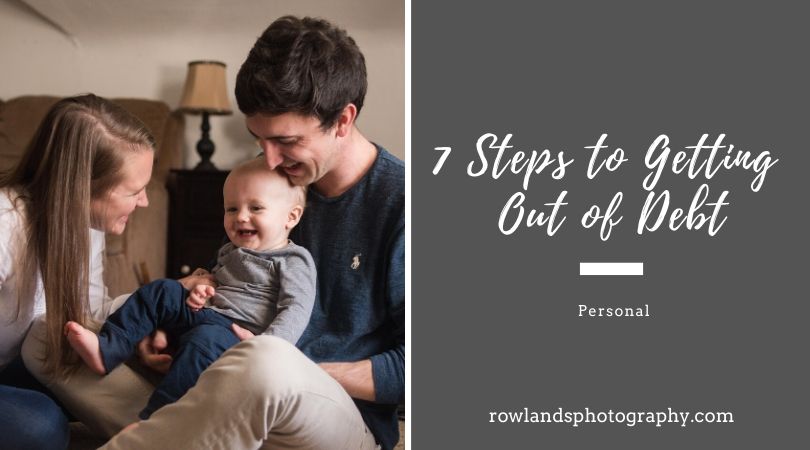Happy 2020, friends! We’re excited to be chatting on the blog today about one of our favorite topics: getting out of debt! Knowing that many people make New Year’s Resolutions about finances, health and new habits, we figured there was no better time than to finally share about our debt-free journey through Dave Ramsey’s Financial Peace University. In the paragraphs below, I talk about our journey to financial freedom and then share our top 6 steps for getting out of debt that we feel made a huge difference in our journey. Though this is not our usual topic on our blog, we hope you enjoy it!
When Michael began listening to the financial guru, Dave Ramsey’s, podcast, I honestly thought, “Okay, this is going to be one of those things Michael gets really into but it’s never going to happen.” To be honest, I didn’t believe our situation was “bad enough” to go through a debt-free program; we only had a few credit cards between us (To be fair, I had 2 and he had 1), my final semester of school in a student loan, and a few small medical bills from Isaiah’s birth. Total, it probably amounted to less than $9,000. I thought to myself, “that’s not THAT bad,” knowing full well that some of my friends and family members had significantly more debt than that. I wasn’t convinced we needed a program to follow to pay it all off. I just assumed we’d pay it off “someday.”
Well, the more time I spent on Instagram following some of my favorite accounts, the more I saw them talk about Financial Peace University and how it changed their marriage and they were able to pay off debt, save for their kids college, prepare for their retirement and more. So I thought to myself, “I’ll just look into where the next class is being held and if there’s somewhere close to us, we’ll talk about going.” Well, it just so happened that my dad’s church (where we frequented often) in Chesapeake was hosting FPU the next month and so we decided we would join.
We started Financial Peace University in October 2018 and by December 2018, we finished the class and we were debt-free! And not only that, but we also almost had a fully funded emergency fund (3-6 months expenses), new life insurance policies for each of us and a monthly budget for us to operate off of that we still use today! Financial Peace University taught us so much about finances, habits and the importance of paying off debt and saving so that we could have financial freedom. It truly did (and continues to) change our life and the life of our family. The things we learned in FPU from Dave Ramsey is changing our family tree day-by-day and we are so thankful for the program.
All of this to say, becoming debt-free IS possible. But it’s certainly not possible without change, sacrifice, perseverance and good support. Below are our 6 steps for getting out of debt, with or without utilizing FPU (though we highly recommend it). We hope it’s beneficial to you in your own debt-free and saving journey!

- Figure out where your money is going
First and foremost, before you can ever make a real dent in your debt or begin to save, you have to figure out where your money is going. If you don’t know where it’s going each month, it will run away from you. Take the time to review your bank statement from the previous month (or last 3) and evaluate your purchases. Which are necessary monthly expenses (rent/mortgage, utilities, gas, etc.)? Which are unnecessary monthly splurges (I’m looking at you, Netflix, Disney+ and Spotify)? What are you splurging on (and why)? How much money are you spending on fast food or restaurants? How much money are you spending on coffee? Once you know where your money is going, you can start to make changes to lessen how much goes where. - Make a budget and STICK TO IT
It goes without saying that in order to successfully manage your money each month, you need a budget. We create a zero-based budget each month, which means we assign every dollar of income a place in our budget. This helps us to stay accountable to our budget (and each other) and lets us know that money is not getting away from us without us knowing about it.
How you decide to track your budget each month is up to you, but the easiest way that we’ve found is through Every Dollar. This website & app allows you to link your bank account(s) and then sort your transactions throughout the month into your budgeted categories, which makes reviewing your budget at the beginning of the next month that much easier.
When creating your budget, it’s important to set realistic but challenging goals in each of your categories. What I mean by this is if you’re used to spending $450 on groceries each month, challenge yourself to only spend $400 this month. If you’re used to spending $5 a day on for coffee 5x a week, challenge yourself to only splurge for coffee on Friday’s. If you have a goal of paying off your debt, you HAVE to make sacrifices to make that happen. - Cut the credit card
One of our favorite classes during Financial Peace University was the class where we got to cut up our credit cards. “Plastic surgery,” as Dave likes to call it, was vital for us to have a visual representation of the fact that we were saying “NO” to credit forever. Once that card is cut, there’s no going back and it felt so good to rid ourselves of our credit cards in 2018.
A lot of times, people will hold to onto credit cards with the justification of “it’s for emergencies,” but if you decide to take FPU you will learn to build an emergency fund (you guessed it…for emergencies) instead which allows you to pull out cash sans interest for unexpected situations rather than “putting it on a card” for you to pay interest on later. - Stop unnecessary spending
Cut off your Netflix subscription. Stop saying yes to every opportunity that comes your way. Cut your coffee habit. Stop justifying your expensive lifestyle you can’t afford. Shift your “I earned this” thinking when buying something you don’t need into “Do I NEED this?” And for the love of all that’s good, STOP GOING TO TARGET.
Once you figure out how much money you’re spending on coffee, food out and Target, that alone will likely shock you into wanting to make a change. If it doesn’t and you need more incentive, think of it this way: How much is that splurge really worth to you? Is that sweater from Target worth an hour of you working at your job? What other bill could you pay off early each month if you didn’t buy coffee out each day, but instead, made coffee at home? Could you get rid of my debt faster if you said “no” to that concert, event, popular electronic item?
Weighing the opportunity cost helps keep us accountable to our goals because we are constantly evaluating whether our splurge purchase is worth x to us. Is this purchase worth more than our family vacation plans? Is this purchase worth more than buying a house means to us? Is this worth more than our retirement means to us?
Every single dollar adds up and shows what you value most. You won’t be in crunch mode forever, but for now, it’s important that you say NO to all the unnecessary spending that is getting you further into debt. - Sell everything you can
When you are in crisis mode (aka paying off debt mode), you will want to take things a step further than creating a budget and cutting unnecessary expenses. Getting a second job and selling things you don’t need can be some of the quickest ways to earn extra money that you wouldn’t otherwise be expecting during the month. This can look like:
* Getting a second (or third or forth) job
—- overtime or extra shifts at your full-time job
—- stay-at-home mom getting a part-time job
—- pizza delivery
—- work for family
—- babysitting
—- retail during holidays
—- grocery delivery
—- music/photography lessons
* Selling things you don’t use anymore
—- clothes
—- books (especially textbooks)
—- purses
—- electronics
—- furniture
—- kids clothes, toys, etc.
—- stuff in your garage your husband hasn’t used in 3 years
—- cars (Yes, we are a 1 car family!)
Aside from being Dave Ramsey followers, we are also minimalists (Hello, Marie Kondo!) at heart which has made saying goodbye to things and selling them that much easier for us. We are constantly going through our things to see if there is anything else in the house we can sell (to add to our savings) or get rid of (for our peace of mind). We only keep a small amount of nonessential items that we keep for memories sake or actual regular use. - When you do shop, shop smart
Before we even began to pay off our debt, I had made an eco-friendly goal for the year of 2018 to not buy any new (with tags) clothes for our family. You may be wondering how I did that with an (ever) growing child. Rather than buying new clothes for Isaiah from Target, Gap or Old Navy, I simply chose to shop for secondhand items at our local consignment shops and resale stores (like Once Upon a Child). At the beginning of each season, I would set aside a small budget for Isaiah’s clothes and then shop for him with that budget. Having a set amount of how much I wanted to spend gave me boundaries, but also allowed me to see exactly how much I could buy for that amount (which is always 5-6x the amount of items I would ever be able to buy somewhere else).
When I saw how much money we were spending monthly on groceries, I realized that we needed to cut our number dramatically. Though going to places like Walmart, Whole Foods, Kroger and Target to grocery shop offers options that you wouldn’t normally have for unique types of foods, I found that I was spending at least 30% more anytime I frequented one of these places. Choosing to make the switch to do our weekly shopping at Aldi instead has cut our grocery bill dramatically, and now I can’t think of shopping anywhere else! If I need a speciality item, I’ll make the extra stop at one of those stores that will have it, but I do my best to only do a small portion of grocery shopping anywhere other than Aldi. Every dollar saved is a dollar to put towards something else that’s more important to us!
Another way that we choose to shop smart (but still enjoy Isaiah & I’s favorite hobby) is by utilizing our public library for books, rather than buying books new. As I talked about above, we keep very few nonessential items in our home and so I have a very small selection of books that I have kept over the years that I revisit on occasion. Because of our desire to stay minimal (and not spend unnecessary money), I do not buy ANY new books that I don’t feel I will want to read again and again, year after year. So how do I still read 25+ newly published books a year? Welcome to your public library! Guys, if you’re a reader and you’re not utilizing your public library, you are missing out! Not only does it not cost a dime (other than your tax dollars), it’s a great opportunity to get out of the house (all the stay-at-home-mom’s rejoice!), meet new people in your community and to learn and read about new things that you wouldn’t otherwise want to spend money on. I’m a huge advocate for supporting your local library and think everyone should be taking advantage of this incredible free resource! - Get support
One of the best things you can do when you’re trying to tackle something as big as your debt is to get support. When you have big goals, you need accountability. It helps you stay on track and reminds you when you’re feeling discouraged that you CAN make it through and it WON’T always be a struggle. This support and accountability can come from a friend, a teacher, your spouse, your church, online community, podcast or, from our favorite way, Financial Peace University classes.
Michael had been listening to the Dave Ramsey podcast for months before we decided to pull the trigger and take Financial Peace University. We were so excited about the class that we talked it up to our sister and brother in law and actually convinced them to take it with us. We spent 9 weeks in class and came out of FPU completely changed!
One year later, our debt is paid off, we have a fully funded emergency fund and we are now in baby step 4 (investing in retirement) with our eyes on baby step 5 (saving for our kids college fund). We are giving more than we ever have and saving more than we ever thought possible. We can honestly say that we’ve never had more fun budgeting and saving to achieve our financial goals.
Hearing the stories from people in FPU who were much older than us as they tackled their debt, saved hundreds of thousands of dollars, paid off their houses early, provided for their kids college funds was so inspiring. It continues to remind us that paying off debt IS possible and the hard work IS worth it and that financial peace IS attainable. You just have to work, work, work and remind yourself every single day why the sacrifice is worth it in the end.

We hope you enjoyed 6 Steps to Getting Out of Debt and reading about our personal debt-free journey through the Dave Ramsey program, Financial Peace University. If you’re interested in attending a FPU class, you can search here for a location near you!
Blessings,
Michael & Chelsea
rowlandsphotography.com
Instagram | Facebook | Pinterest
If you liked this blog, you may like enjoy other personal blog posts from about our family.
If you’d rather head back to all the pretty things, browse by category below:
Weddings
Engagements
For Brides
Bridal Sessions
Michael & Chelsea Rowlands are a husband & wife wedding photography team based in Hampton Roads, Virginia, serving all of Virginia, North Carolina, South Carolina & beyond.
